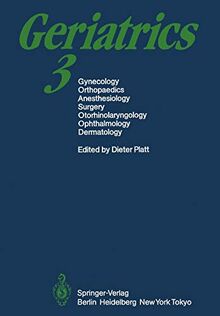
Volume 3 of this series is concerned with geriatric aspects of surgical specialties: gynecology, orthopedics, general surgery, otorhinolaryn gology, and ophthalmology. Closely associated with these specialties is anesthesiology. Dermatology has an intermediate position between surgical and nonsurgical fields. The peculiarities of physiological and pathological aging of otgans and the consequences for diagnosis and therapy - presented in the first two volumes - are of great significance, especially for surgical special ties. There are a large number of pre-, intra-, and postoperative problems in multimorbid geriatric patients, e. g. , coronary insufficiency, brady arrhythmias, hypertonia, and hypotonia. While as recently as the tum of the century the age of 65 years was viewed as a contraindication for sur gery, today even older patients undergo operations on aortic aneurysms, bypass operations for coronary sclerosis, pulmonary resections, and abdominosacral resections of rectal carcinomas, for example. Pre requisite for successful surgery at an advanced age is good pre- and postoperative care of multimorbid patients. Physiological changes of the lungs with aging, the increased frequency in pneumonia and pulmonary just a few embolisms with age, and the decrease in receptors, to give examples, confront anesthetists with difficulties. The maxim "in old age a little less" is also applicable in this field. Only improved experimental gerontological research, possibly reaching even into anesthesia, will provide objective data for anesthesia in elderly patients. The skin is an organ that experiences characteristic qualitative and quantitative changes in old age.